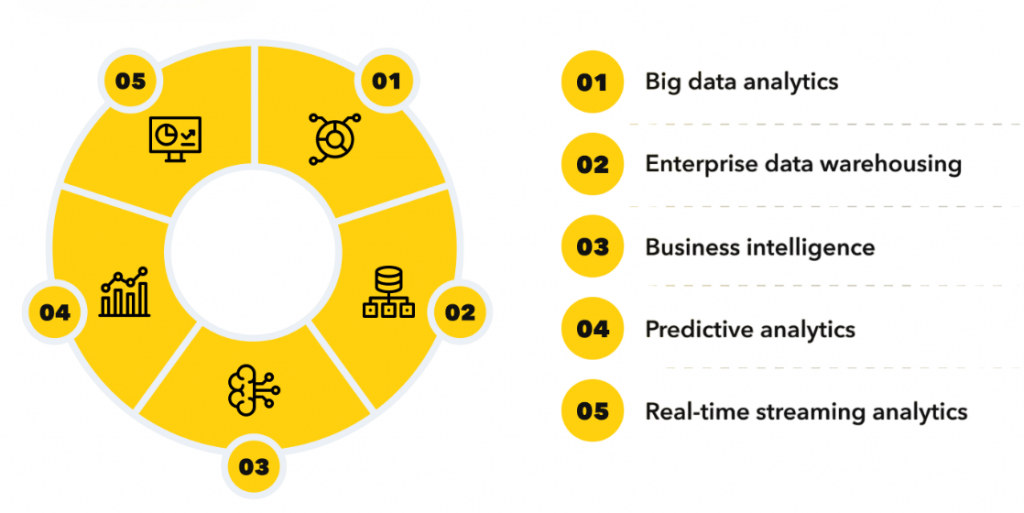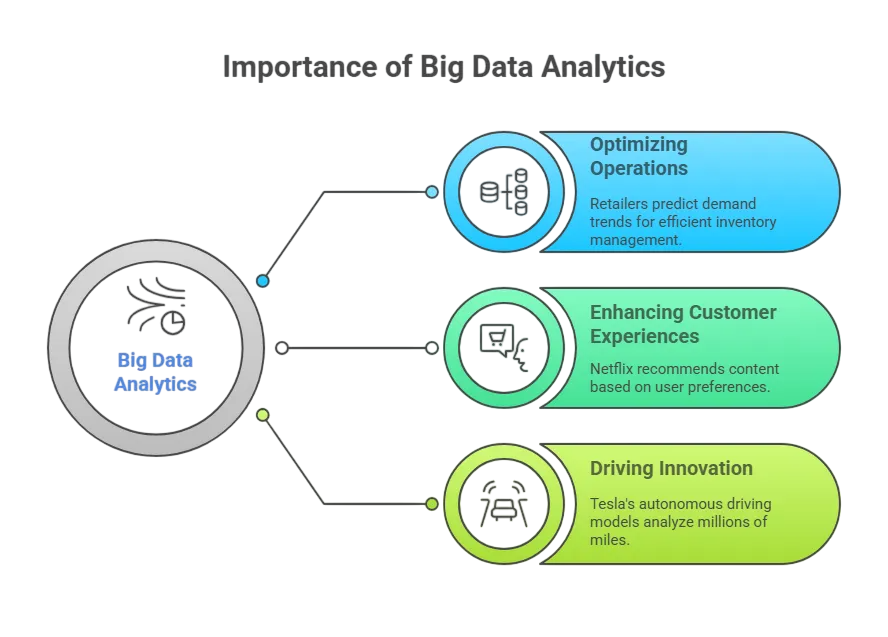
- Introduction: The Enterprise Rush Toward Data
- Why Big Data Matters More Than Ever
- The Role of Big Data Experts in Modern Organizations
- Skills Enterprises Look for in Big Data Professionals
- Big Data Job Roles in Demand
- Common Technologies and Tools to Master
- Certifications That Enhance Your Big Data Profile
- Educational and Professional Backgrounds That Fit
- Signs You’re Ready for an Enterprise Big Data Role
- Final Thoughts: Bridging the Gap Between Aspiration and Qualification
Introduction: The Enterprise Rush Toward Data
Data has become the defining currency of modern business. From multinational banks and healthcare giants to logistics firms and retail conglomerates, enterprises today are racing to leverage vast volumes of data to drive decision-making, uncover insights, and innovate faster than their competitors. But collecting terabytes of data is one thing; making sense of it requires skilled Data Science course professionals who can extract meaning, develop scalable solutions, and deliver value. To succeed in this field, candidates must master a range of Data Tools such as Hadoop, Spark, and cloud platforms, while also developing strong analytical and business skills. Enter the Big Data expert the architect of intelligent infrastructure, the engineer of high-volume pipelines, and the analyst who finds patterns in chaos. The question for many aspiring professionals is: Are you qualified to meet this enterprise demand.
Why Big Data Matters More Than Ever
With every digital click, swipe, and transaction, companies generate massive volumes of data. The rise of connected devices, social media, AI, and IoT has further escalated this data explosion. Certifications and hands-on experience with leading Data Tools can significantly boost your employability. For enterprises, this data is a goldmine of competitive advantage but only if they have the expertise to mine it properly. Exploring the Big Data Hadoop Universe can provide the foundational knowledge needed to unlock that potential.
Big Data helps enterprises:
- Forecast market trends and consumer behavior.
- Improve operational efficiency and reduce costs.
- Detect fraud and security threats.
- Personalize customer experiences in real time.
- Make data-driven decisions across departments.
- Designing and building scalable data systems.
- Cleaning and transforming raw data into usable formats.
- Skills of Big Data Hadoop Professionals include integrating structured and unstructured data sources to generate meaningful insights.
- Creating predictive models or real-time dashboards.
- Ensuring data privacy, compliance, and governance.
- Collaborating with data scientists, analysts, and business teams.
- Proficiency in Hadoop ecosystem tools like HDFS, MapReduce, Hive, Pig.
- Experience with Apache Spark, Flink, Kafka for real-time data processing.
- Knowledge of NoSQL databases like HBase, MongoDB, or Cassandra.
- Strong grasp of SQL, data modeling, and relational database concepts.
- Comfort with cloud platforms (AWS, Azure, GCP) for data storage and analytics.
- Learn Hadoop to complement your programming fluency in Python, Java, or Scala and effectively manage big data workflows.
- Ability to work with large, messy datasets and derive insights.
- Familiarity with data visualization tools (Tableau, Power BI, etc.).
- Understanding of key business metrics and KPIs.
- Collaborative mindset for working with cross-functional teams.
- Big Data Engineer: Builds and maintains the architecture (pipelines, storage, workflows) needed to process large datasets.
- Data Architect: Designs the blueprint for enterprise data systems, ensuring security, scalability, and efficiency.
- Data Analyst: Translates complex data into easy-to-understand insights, dashboards, and reports.
- Data Scientist: Applies Data Science course, including machine learning and statistics, to solve complex business problems.
- Hadoop/Spark Developer: Focuses on developing high-performance distributed processing applications.
- ETL Developer: Specializes in data ingestion and transformation processes.
- Big Data Administrator: Manages Hadoop or cloud-based data clusters and ensures system reliability.
- Big Data Frameworks like Hadoop (HDFS, YARN, MapReduce), Apache Spark for batch and real-time processing, and Kafka for data streaming.
- Data Storage & Management tools such as Hive, Pig, HBase, Cassandra, Amazon S3, and Azure Blob Storage are essential components and resources like HDFS Made Easy can help simplify your understanding of these complex systems.
- Data Pipelines & Orchestration platforms including Apache NiFi, Airflow, and Oozie help manage data flow and automation.
- Programming & Query Languages like Python, SQL, Scala, and Java are essential for working with big data.
- Visualization & Reporting tools such as Tableau, Power BI, and Superset turn data into insights.
- Cloudera Certified Associate (CCA) Data Analyst / Administrator.
- Hortonworks HDP Certified Developer.
- Google Professional Data Engineer.
- Microsoft Azure Data Engineer Associate.
- AWS Certified Data Analytics – Specialty.
- Databricks Certified Data Engineer / Data Scientist.
- A degree in STEM or a quantitative field.
- Prior experience in data handling, programming, or reporting.
- Exposure to software engineering, database management, or BI tools
- You’ve worked on projects involving large-scale datasets.
- You understand how distributed systems work.
- You’ve written MapReduce or Spark jobs now you might be wondering, What is Apache Solr?. It’s a powerful search platform that can help you index and search large volumes of data efficiently.
- You can clean, transform, and query data using SQL or Python.
- You’ve completed a hands-on Big Data certification.
- You can explain data workflows to both technical and business teams.
- You enjoy solving open-ended problems using data.
This is why Big Data is not just a tech function anymore it’s a strategic business priority, and professionals skilled in this area are in high demand.
The Role of Big Data Experts in Modern Organizations
Big Data experts form the backbone of enterprise analytics and digital transformation initiatives. Whether transitioning from IT or starting fresh, learning the right Data Tools positions you for success in enterprise Big Data careers. Their roles span across technical development, architecture planning, data governance, pipeline optimization, and insight generation.

Typical responsibilities include:
In short, Big Data professionals help enterprises unlock hidden value from complex data ecosystems, bridging the gap between raw information and actionable business intelligence.
Do You Want to Learn More About Data Science? Get Info From Our Data Science Course Training Today!
Skills Enterprises Look for in Big Data Professionals
Enterprises don’t just want generic IT professionals they want individuals who combine technical expertise, domain knowledge, and business acumen. To be enterprise-ready, you should possess a well-rounded mix of the following:
Core Technical Skills:
Analytical and Business Skills:
Enterprise roles demand more than just coding they require a professional who can see the bigger picture, align tech efforts with business goals, and deliver results.
Big Data Job Roles in Demand
Enterprises now offer a wide variety of specialized Big Data roles. Understanding these can help you position yourself effectively:
Each of these roles requires a slightly different skillset, but all rely on a foundational understanding of Big Data principles and ecosystems.
Gain Your Master’s Certification in Data Science Training by Enrolling in Our Big Data Analytics Master Program Training Course Now!
Common Technologies and Tools to Master
To become a true Big Data expert, it’s important to know the key tools, frameworks, and platforms that drive today’s data systems. Some of the most in-demand technologies include:
Mastering even a few of these tools can make you a strong candidate for enterprise-level roles in the data field.
Preparing for Data Science Job? Have a Look at Our Blog on Data Science Interview Questions & Answer To Acte Your Interview!
Certifications That Enhance Your Big Data Profile
While skills are paramount, certifications serve as proof of your expertise and help your resume stand out. Enterprises often use certifications as a filtering tool in hiring processes.
Some valuable certifications include:
These certifications often involve real-world scenarios and performance-based tasks, making them highly respected in hiring circles one of the Top Reasons to Switch Your Career to Big Data today.
Educational and Professional Backgrounds That Fit
You don’t necessarily need a PhD to work in Big Data. In fact, people from diverse educational backgrounds engineering, computer science, statistics, economics, even non-technical fields are finding success in enterprise Big Data roles.
If you have:
you are a strong candidate for Big Data upskilling. Many professionals transition from roles like software developer, QA tester, analyst, or system admin into Big Data after completing short-term courses or certifications.
Signs You’re Ready for an Enterprise Big Data Role
Still wondering if you’re enterprise-ready? Here are signs that you’re on the right path:

If you check most of these boxes, you’re likely well-prepared for an enterprise Big Data role or just a few steps away from becoming so.
Final Thoughts: Bridging the Gap Between Aspiration and Qualification
Enterprises across the world are undergoing digital transformations powered by data. But without skilled experts to guide this evolution, even the best tools fall short. The opportunity for Big Data professionals has never been greater, but the expectations are equally high making a Data Science course more valuable than ever for staying competitive.The good news? With the right skills, certifications, projects, and mindset, you can position yourself as an enterprise-ready Big Data expert. Whether you’re starting fresh or transitioning from another tech role, the path is open and the demand is undeniable.


